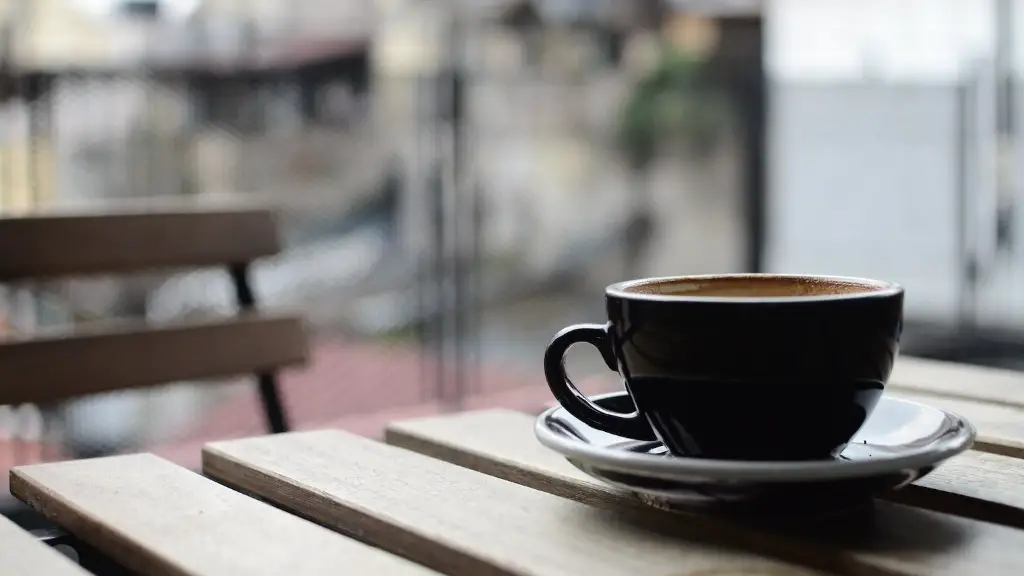Physical And Mental Effects
Once you stop drinking coffee, you will notice physical and mental changes in your body. Your body’s natural circadian rhythm, which helps you fall asleep and stay awake, will be disrupted. You might feel a bit overly tired during the day and may have difficulties getting to bed at night. This is because your body will take time to adjust to not having the caffeine in your system.
The mental effects are often more pronounced. You will notice you feel a bit more motivated and relaxed because the stimulant effects of coffee are no longer contributing to anxiety, irritability and restlessness.
Furthermore, the amount of energy you have will return to a normal level. You may notice that you have more energy durin the day, without the jittery feeling you could have experienced when drinking coffee.
Your sense of focus and mental clarity may also improve. The stimulant effect coffee has on your body is suppressing, which is why coffee can make you feel foggy, sluggish and unfocused. With coffee out of your system, however, you might be able to focus better throughout the day.
Gastrointestinal Effects
Coffee can be especially harsh on your digestive system, as it makes your stomach produce more acid. This can lead to indigestion, heartburn, and an upset stomach. Without the caffeine, these symptoms are likely to be less severe, and you may notice fewer stomach aches.
If you are prone to constipation, stopping the consumption of coffee can be a good way to relieve this symptom. Coffee acts as a laxative and will make you have to use the toilet more frequently. Once you stop drinking coffee, you may experience a more regular and healthy bowel routine.
Mood and Anxiety
The amount of caffeine many people are consuming each day may have a more significant impact on their mood and anxiety levels than they think. Besides affecting your sleep, and making you feel edgy and restless, coffee consumption can even contribute to the onset of mild panic attacks. In some cases, coffee can even increase the severity of existing anxiety conditions.
Without coffee, your anxiety levels are likely to go down. Anxiety is caused by both physical and psychological factors, so the absence of coffee can benefit your psychological balance. Mental health experts also report that some of their patients experience a reduction of depression-like symptoms when they stopped drinking coffee.
Conclusion
Although coffee does bring many benefits, like increasing focus and improving our alertness, drinking it in excess can have some adverse effects on our body and mental health.
Stopping drinking coffee may have both physical and mental effects and can help improve your digestive health, reduce your anxiety levels and improve your mood. Depending on how much coffee you were drinking, however, you might have to give your body some time to adjust to the absence of the drug.
Effects on Kidneys
Caffeine can have a diuretic effect, which means it increases your urine output. This can result in dehydration, especially if you are drinking coffee in between meals. Those prone to kidney stones are also advised against drinking too much coffee, as the extra acid it produces may increase the risk of these stones.
Once you stop drinking coffee, you might find that you do not need to go to the toilet as often. This will help you maintain your body’s water balance and avoid dehydration. Coffee-induced kidney stones may also become less likely to occur.
Effects of Long-Term Reduction of Coffee Intake
Long-term reduction in coffee intake might have even more remarkable effects. Some experts suggest that people who stop drinking coffee will see their cholesterol levels decrease, as well as their risk of type 2 diabetes. Additionally, it may be possible to improve your cardiovascular health with a reduced intake of coffee, as it can help your blood pressure remain at healthy levels.
Finally, reducing your intake of coffee in the long term might also be beneficial for your mental health. Studies suggest that overconsumption of coffee can increase the risk of mental health conditions, such as depression and anxiety. However, reducing your intake may help reduce these risks, as well as helping to improve your general mental agility and stability.
Effect on Sleep
Like many other stimulants, caffeine can also have an effect on your sleep patterns. In some people, caffeine can increase wakefulness and make you feel more energized, even when your body is expecting to go to sleep.
When you stop drinking coffee, your body’s natural process of producing melatonin (the sleep hormone) will make it easier for you to fall asleep and stay asleep. With a little time, your body will adjust and you will start sleeping better than before. You will also be less tired during the day, as the repeated caffeine highs and lows can take their toll.
Effects on Skin
Caffeine is one of the most widely consumed substances in the world, and many people do not realize the effect that drinking coffee has on their bodies. Coffee can act to dehydrate the body, which can in turn lead to dry and flaky skin. As well as this, the caffeine can cause the skin to produce more oil, leading to breakouts or acne.
When you stop drinking coffee, you may find that your skin feels softer and more hydrated due to the absence of coffee’s diuretic effects. The production of extra oil may also reduce, leading to fewer skin problems. Some people have also noticed a more consistent, even skin complexion after quitting coffee.





